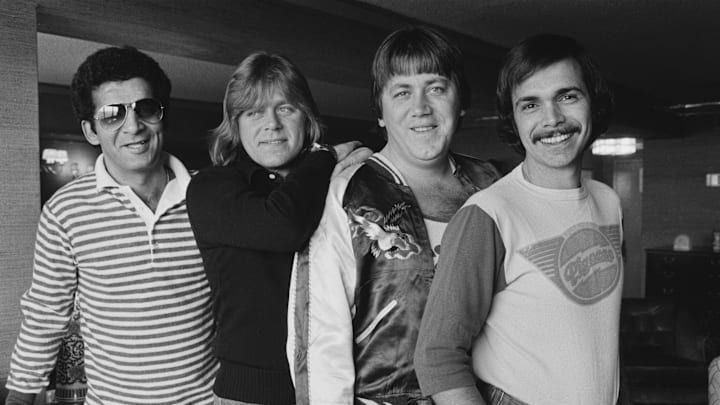Granted, that's a harsh judgment, selling one's soul for commercial success. But not as harsh as saying a band decided to make money instead of music. Neither of those is exactly true. But the spirit of Chicago, and especially the overall quality of their music, suffered as the hits kept coming.
The band first came together in a certain large midwestern metropolis under the name, the Big Thing, in 1967. Thankfully, they came to their senses and changed that to Chicago Transit Authority the following year.
I like it, they liked it, but the mass-transit company was less enthusiastic. Still, their first album, an eponymously titled double-disc release, reached number 17 on the charts in 1969 and was eventually certified platinum.
My deepest apologies to Robert Lamm, but that was "Only the beginning, only just the start." Chicago would go on to sell over 100 million records worldwide. Five consecutive albums charted at number one on the Billboard 100, and the band eventually had 21 hit singles. Three of those charted at number one. And therein lies the problem.
It's hard to believe now but Chicago was once at the pinnacle of creativity
Crazy, right? Their deeper cuts are what truly built their fanbase. The album version of "Beginnings" on Chicago Transit Authority has a runtime of 7:54, while the closing song of disc four, "Liberation," is a masterful jam session of 14:38.
As Jimi Hendrix told sax player Walter Parazaider, "Your horn players are like one set of lungs and your guitar player is better than me." They opened for him, so he would know.
Their second album, simply titled Chicago, made their bones. Another double album, it reached number four on the charts in 1970, and had three singles chart in the top 10. Two of the singles, "Make Me Smile" and "Colour My World," are actually truncated sections of the suite, "Ballet for a Girl in Buchannon."
For those who only think of the band as the soft pop band it eventually became, give this a few listens. And heed the liner note from Robert Lamm: "With this album, we dedicate ourselves, our futures, and our energies to the people of the revolution. And the revolution in all of its forms."
The band released another double album the following year, Chicago III. It featured even longer suites with rich instrumental segments than their debut album. One of the highlights of the album is the opening song, "Sing a Mean Tune, Kid," featuring several funk-fueled jams and vocals by Peter Cetera that actually rock. "Baby, what a big surprise," indeed.
The double album features three suites that are triumphs of musicianship. But as Billy Joel said of one Beatles album, your mileage may vary.
A live four-disc album, Chicago at Carnegie Hall, followed later in 1971, documenting their sold-out week-long run at - you guessed it - Carnegie Hall. In 1972, the band released Chicago V, their first single LP. It has its fans, and included their biggest hit single up to that point, "Saturday in the Park." The album itself was the first to chart at number one, but the lack of any lengthy suites marked the start of their slide into pop.
1973's Chicago VI continued that slide. It charted at number one, as did their next two albums, but the instrumentals were long gone, as were the long-form suites. Chicago VII saw a return ot the double album format, and more jazz-influenced instrumental tracks. It also featured more ballads, including the banal "Wishing You Were Here."
Yes, I know a lot of people love it. But popularity has never been the true measure of greatness.
The reason behind the trend toward a lighter, more radio-friendly format was, of course, money. Producer James Guercio and Columbia Records both applied pressure to churn out more hits. Peter Cetera was only too happy to comply. No doubt he was "Feelin' stronger every day," as his influence as a composer and lead singer continued to grow.
The death of guitarist Terry Kath in 1978 cemented the move to the - shudder - easy listening side of music. But the die had already been cast. As Ken Terry wrote for Cashbox in 1977, "Chicago ultimately presents itself in the best light with AM-oriented, good-time music. Its fans are not looking for complicated, introverted songs; they want music to drive to, dance to, and work to."
Chicago is hardly the only band that sold out. Jefferson Airplane became Starship, Fleetwood Mac became, well, not the blues band Fleetwood Mac, that's for sure. Add Coldplay, Maroon 5, and dozens of others. And the beat goes on. Did these bands sell out, or did they evolve? All I know is that the prime jazz-rock band of the 1970s may still be around, but they're no longer the real Chicago.
